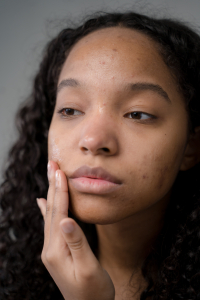
All of us are usually familiar with acne, pimple, blackheads, or whiteheads. We have either experienced them or know of people who have them. It is a skin condition where the hair follicles clog with dead skin cells and oil. Acne is more predominant in teenagers, but they are certainly not limited to that age group.
Depending on how severe your skin condition is, the symptoms of acne include the following:
- Clogged skin pores – closed, also known as whiteheads
- Clogged skin pores – open, also known as blackheads
- Small bumps that are red and tender to touch, also known as papules
- Papules with pus in them at their tips, also known as pimples or pustules
- Large lumps just beneath the skin layer that are solid and painful to touch, also known as nodules
- Bumps under the skin layer that are pus-filled and painful to touch, also known as cystic lesions
The usual spots where acne can appear are the face, shoulders, upper back, and chest. Appearances of acne or regular bouts and bursts of acne can cause severe emotional distress and can also cause skin scars. To combat that, you should start medical treatment as soon as possible. The earlier you start the treatment, the lesser your distress is likely to be.
There are a lot of self-care remedies available online for the treatment of acne. Here are some of the more widely known remedies:
- Reducing the intake of oil or oil-containing products in your diet
- Using tea tree oil for external application
- Applying tea extracts
- Applying moisturizers curated for your skin type
Everyone has their secret tips and tricks to combat, reduce, or prevent acne, depending on whom you ask. However, you use these remedies cautiously. It might be a good idea to get expert medical advice before you do anything too intrusive on your skin.
One of the times when acne is most likely to flare up is just before your periods which doesn’t help with your usual period symptoms. Acne flare-up is a lot to deal with your typical period symptoms of moodiness, bloating, and cramps. This flare-up of acne starts around seven to ten days before your period is due and recedes when you get the period. Of course, it happens if you are one of the acne-prone people.
During your period, the estrogen (female sex hormone) level of the blood increases. Shortly after your period, the progesterone (pregnancy hormone) level of the blood rises. However, a week before your period is due, both the hormone (estrogen and progesterone) level dips, keeping your testosterone level intact. This hormonal imbalance leads to extra secretion of sebum or oily substance from the sebaceous gland. Hence the acne flare-up.
These are all good-to-know facts. However, it might be a little too much when dealing with the real thing. So when should you be worried, and when is the right time to consult a doctor? Read on!
You should start being careful and monitor your health if you have irregular periods or have any symptoms related to polycystic ovary syndrome (PCOS). The most common symptoms of polycystic ovary syndrome are the following:
- Abnormal hair growth on your chest, back, or face
- Weight gain or difficulty losing weight
- Dark skin patches across your body
If you have any of the above symptoms, there are chances that you might have polycystic ovary syndrome. So let’s take a look at these symptoms individually.
Abnormal hair growth on your chest, back, or face
In individuals suffering from polycystic ovary syndrome, the amount of testosterone hormone produced by the body is much higher than in normal females leading to abnormal hair growth in the face, around the back, and in your chest area.
So how do you deal with it? Some regular advice is using hair removal creams, hair removal treatment using laser, shaving, and waxing. There are some medicines available that will reduce the testosterone level in your body. A reduced testosterone level means your excess body hair will reduce.
Weight gain or difficulty losing weight
If you have difficulty losing weight or are gaining weight without rhyme or reason, make sure you go to your doctor before taking any drastic steps or trying the next best diet plan.
If you are diagnosed with polycystic ovary syndrome, eat balanced meals that are healthy and have them in small proportions. Make sure that you work out for at least half an hour a day. This workout can be any form of physical activity as it reduces testosterone and insulin in the blood.
Dark skin patches across your body
The appearance of dark skin patches across the body is also known as acanthosis nigricans. It’s one of the common symptoms of polycystic ovary syndrome. If you have this symptom, ensure that you visit a certified dermatologist who will put you on medication, including gels and oral pills, that will help combat the issue.
In conclusion, acne is an everyday occurrence in the life of innumerable people. When linked to periods, they become a tad inconvenient. However, if accompanied by more severe symptoms like those listed above, make sure you consult your doctor. Take extra care not to self-medicate based on what you have heard, or what your friends and families have suggested. Everybody’s body system is different, and what might work for some while may not work or be detrimental for others.
Source link: https://www.healthline.com/health/period-acne#causeshttps://my.clevelandclinic.org/health/diseases/8316-polycystic-ovary-syndrome-pcos



